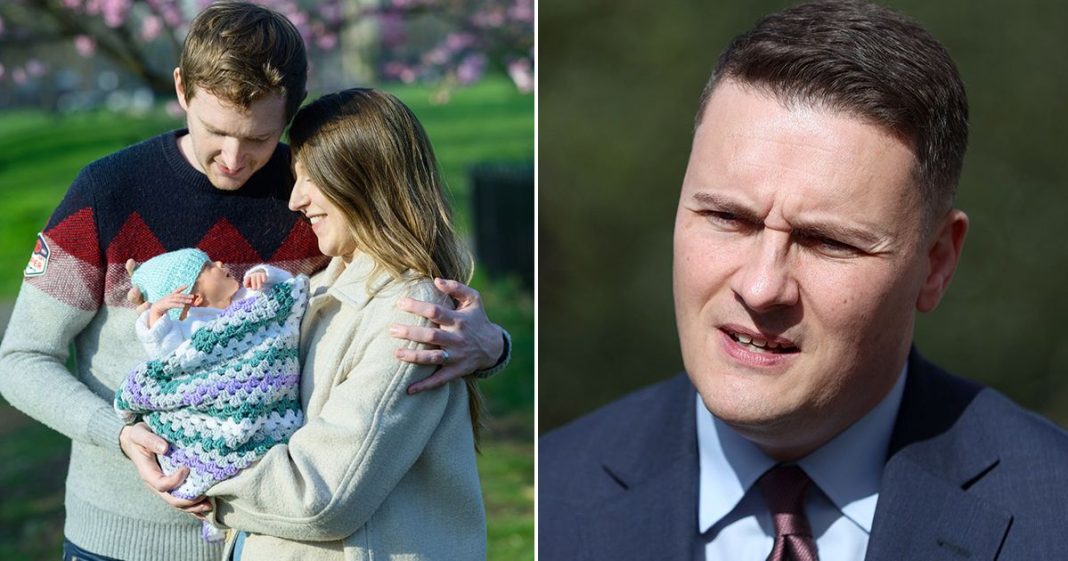Wes Streeting has hinted womb transplants could be available on the NHS in the future following the landmark birth of baby Amy Isabel Davidson.
The infant was born in February after her mum Grace became the first woman in the UK to undergo the procedure. She received the uterus of her older sister, Amy, in a historic operation after decades of painstaking scientific research.
Asked if this could be a procedure available on the NHS, Mr Streeting told Times Radio: “Well quite possibly”. He added: “I mean, we have fertility treatment available and there are some people in our country and some aspiring parents who are not able to conceive – and that can be a really difficult moment in people’s lives and relationships, and that’s why, you know, novel medical research – IVF, for example – has been game-changing for people who otherwise would not have been able.”
The news of Amy’s birth gives hope to thousands of women born without a womb or whose womb fails to function. Mrs Davidson, who was born with was born with Mayer-Rokitansky-Kuster-Hauser (MRKH), said: “We have been given the greatest gift we could ever have asked for.”
The condition means women have an underdeveloped or missing womb, but functioning ovaries which are intact and able to produce eggs and female hormones. Mr Streeting pointed to the creation of a new Health Data Research Service, with £600million of Government funding, as evidence of the UK’s commitment to pushing scientific boundaries.
He said: “One of the reasons why this week, the Prime Minister announced our new Health Data Research Service is we want the UK and the brilliant science we have here to be at the forefront of what will be a really exciting revolution in life sciences and medical technology.
“And that’s why we’re going to marry our brilliant British science with the best of our National Health Service to make sure we’re not just benefiting from that revolution, but we’re actively driving it. If you think about what we did at pace during the pandemic to develop the Covid vaccine – imagine if we did for cancer, what we did for Covid?”
Asked about birth rates, Mr Streeting added: “I’m anxious about the birth rate in this country – it does present long-term demographic challenges for our country, but beyond the hard-headed economics, there is also the joy and love and wonder of parents being able to have children, people being able to have children.”
Mrs Davidson then had surgery in February 2023 to receive the womb from her sister Amy Purdie, 42, a former primary school teacher, who is mother to two girls aged 10 and six. Several months later, one of the stored embryos was transferred via IVF to Mrs Davidson.
Amy, who weighed 4.5lb, was delivered several weeks early in a planned 90-minute caesarean section, to ensure a safe, hospital-based delivery.
Her mum, who welcomed the newborn with husband Angus, said: “It had been such a long wait. We’d been intending to have a family somehow since we were married, and we’ve kind of been on this journey for such a long time. Having waited such a long time, it’s kind of odd getting your head around that this is the moment where you are going to meet your daughter.”
And she continued: “The moment we saw her was incredible, and both of us just broke down in emotional tears – it’s hard to describe, it was elation.”
The medical breakthrough follows 25 years of research by Prof Richard Smith. And it is more than 15 years since he first presented his rabbit study on womb transplants to the American Society for Reproductive Medicine conference in Atlanta in the US.
Speaking after Amy’s birth, he said: “”I feel great joy actually, unbelievable – 25 years down the line from starting this research, we finally have a baby, little Amy Isabel. Astonishing, really astonishing. There’s been a lot of tears shed by all of us in this process – really quite emotional, for sure. It is really something.”
At Reach and across our entities we and our partners use information collected through cookies and other identifiers from your device to improve experience on our site, analyse how it is used and to show personalised advertising. You can opt out of the sale or sharing of your data, at any time clicking the “Do Not Sell or Share my Data” button at the bottom of the webpage. Please note that your preferences are browser specific. Use of our website and any of our services represents your acceptance of the use of cookies and consent to the practices described in our Privacy Notice and Cookie Notice.






